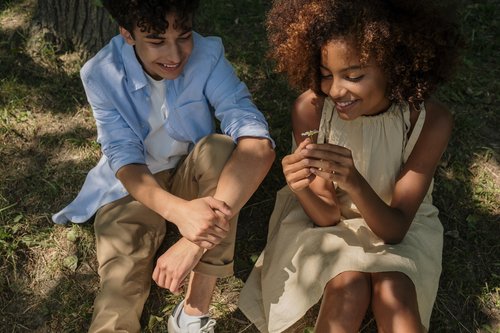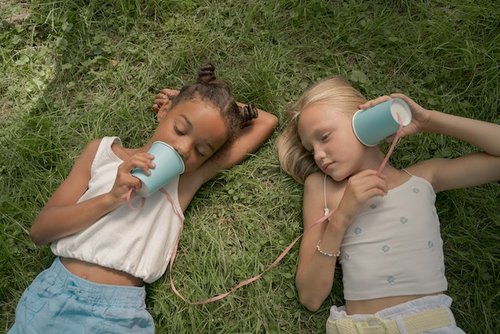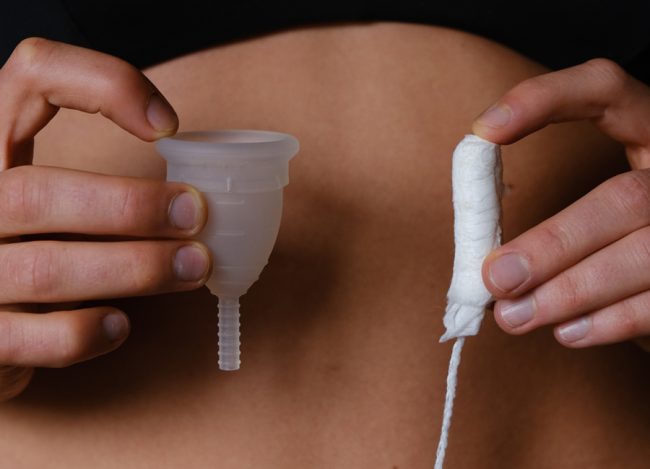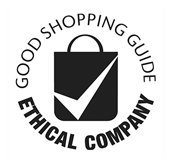How to talk to your child about periods: parents’ guide
Tips for parents: how to talk to your sons and daughters about menstruation
While the average age for the first period is around 12 in the UK, they can start as early as 8. Whatever the age, it can be a tricky subject. How you broach the subject might depend on the actual age of the child, but also their personal maturity and outlook.
Does it help to cast our minds back to our own experiences? Or should we think forward and consider a new approach? Join our Mooncup Advisors, Sophia and Nicky, to get their top tips on how to talk your daughter or son about periods.
Our top 10 tips on how to talk to your child about periods
-
Start the conversations early
Try to introduce periods into the conversation early on, both with and around the young people in your life. This helps to normalise them and reduce awkward feelings that may commonly creep in further down the line. Rather than visualising a big ‘tell-all’, think of it being a sequence of conversations building on each other over time.
You can keep things brief to start with and just see how it naturally develops. Depending on their age, it’s usually best to do this when the two of you are alone to avoid any potential feelings of embarrassment they may have. Look for moments when the topic naturally comes up to open the conversation. These might be storylines on TV shows, news stories, social media ads, when out shopping, or just at home when your own menstrual products are about. Doing this can also lay the groundwork for other important conversations around health, relationships, and sexuality.
-
Get comfortable with periods yourself
Thankfully in many parts of the world, talking about periods is a far less taboo subject than it once was. That doesn’t necessarily mean that we are all suddenly super-confident or comfortable talking about them- and that’s ok! When you know these types of conversations are on the horizon, it can be an opportunity for you to reflect on your own feelings around them. This applies to everyone: whether you have periods yourself or not.
If you find talking about periods or puberty tricky, or your child finds it too awkward, you may find watching or reading something together can take the pressure off you both. Your child may want to look at this by themselves without you – this is ok too. We have included some useful links at the end of this article.
-
Don’t worry about aiming for perfection
It’s easy to get wrapped up in getting the conversation ‘right’ and imagine that if things don’t go as you’d planned you’ve blown it! But cut yourself some slack. Like so many other topics around growing up, talking about periods is an ongoing and evolving conversation. Neither of you is going to feel relaxed if you’re putting pressure on yourself. Just view it as the start of a conversation, or the next step in it, and see where it leads.
With my background in healthcare, I thought talking about periods with my daughter would be plain sailing! However, as the teen years approached, my daughter decided that everything to do with bodies was DISGUSTING and she’d firmly plug her fingers into her ears at even the slightest mention! Where did it all go so wrong?! I didn’t want to push her, but as time passed, I became increasingly mindful that this was something she really needed to know about before she potentially got caught out.
I decided to take the plunge and purchased a few different period products: reusable and disposable pads, tampons, and of course my trusty (cleaned!) Mooncup. I sat her down one day and explained that she didn’t need to say anything if she didn’t want to. I would talk for 5 minutes and then just leave the items in a specific drawer and she could go look anytime she wanted. I then briefly talked her through them, as well as explained some of the early signs that your periods might be starting soon and how to manage them. Not a word was uttered but she also didn’t plug her ears…
A few months later I realised some pads were missing… Lo and behold she had started her periods and not told me! I did feel a bit sad and bereft that she hadn’t wanted to talk to me about it but also comforted myself knowing that at least she’d felt equipped enough to deal with them herself. Even now, a few years on, there is minimal discussion about these things. I have found texts to be the best way for her to communicate about things that she finds too uncomfortable to discuss in person… and that’s fine. In contrast, my teenage son has always been totally at ease discussing such things and he is kind when I am PMS-ing to the max. I hope this is something he’ll carry forward in life as a supportive and empathic human being.
– Jen
-
Think about what you would want to know before your first period
“What happens? How do I manage it? How much blood will there be? Will everyone know if I am on my period? What about swimming, sport or gymnastics? What if I’m in class when my period starts?”
Think about what you would have wanted to know, and what information would have helped you to feel prepared and less anxious about your first period. Lots of young people worry about their period starting suddenly at school. Help them feel prepared by carrying around a pad or two in their school bag. Letting them know they can go to their school nurse can help them feel less anxious. Before their periods arrive, they may find it helpful to practise putting on and wearing a pad for a bit just to get used to it. If they are using disposables, having some spares can also help them to support friends who might start their period or be caught out at school too.
-
Make it personal
Talking about your own and friends’ period experiences, both as a teenager and adult, can help make periods feel much more relatable. It also shows them that their own experiences are up for discussion whenever they feel the need. First period experiences can also be really helpful to share. Just remember to keep things positive, or at least with a positive ending so it doesn’t cause worry.

-
Periods – something everyone needs to know about
Even if your child is not going to be having periods themselves, they will certainly be spending time with people who are! Periods are experienced by around half the population of planet earth, so they’re something we all need to know about and understand. Covering the biology basics, practicalities and physical or mood changes that can come with periods, can help to be more compassionate. It will also help to reduce stigma and to tackle period-shaming attitudes.
And that goes to you too dads…
If you’re a dad, male carer or a relative, we get that approaching the topic of periods might feel extra challenging. Perhaps it has been an ‘off limits’ topic in your upbringing. Or you simply don’t know that much about periods yourself. But here you have a great opportunity to break down stereotypes and change the narrative. You might not have the personal experience of periods, but you can still educate your children or the young people in your life, be supportive and compassionate, and set an example. Take some time to refresh your knowledge and just keep things relaxed and the conversation open.
My eldest daughter started her period at 13, and the youngest at 11 which I felt was rather young, bearing in mind I still cut her little nails and have to remind her to brush her teeth every day.
I wonder if we all secretly have a preconceived notion that we will be the cool easy-going mum that young people feel they can talk to? In reality, there is the absolute possibility that our kids see us as we did our own parents. I assumed that my girls would be open and happy to share some of their transitions through puberty with me. I wonder if the taboos and stigma around menstruation are still so ingrained in society that even the most woke of mums may struggle to get their young ones to open up.
At home, I’ve never been a bathroom door locker, so over the years, my daughters have certainly been inadvertently privy to some period management in all its glory. Yet when it’s their time of the month, that door is most definitely bolted. Understandably, it’s a time when privacy should be paramount.
My daughters thankfully did both come to me when they started their periods. We talked a little (as much as they could bear – reading their faces), hugged it out, got down to the practicalities (this was pads for them, though wish I had opted for reusable ones from the get-go), and rolled with that. In our house, there was no baking of a celebratory cake or dancing – but there was a mutual understanding between mother and daughter that was seemingly positive, respectful, and natural. We are now looking at switching to reusable pads and period pants. Not met with quite as much enthusiasm as when shopping for the latest video game or trainers, but we have come a long way and I strive to keep the conversation going.
– Mona
-
Check in with your child about what they know…or think they know
With younger children, you’re more likely to have a sense of what they may or may not know. However, as they head towards the pre-teen and teen years, it’s a good idea to fact-check their knowledge of periods. Friends and playground chatter are well-established routes of period disinformation. I can certainly recall a few ‘horror stories from my youth, none of which had the slightest factual basis!
With older children and teens, checking in can help to avoid the classic eye-rolling that accompanies anyone trying to tell them something they already know… You know the one I mean! Simple openers such as ‘Do you know anyone who has started their period?’ or ‘ is it something you’ve started learning about in school?’ can just open up a conversation. Once you know where things are at, just take things from there.
-
Keep language clear…
Euphemisms such as ‘time of the month’ and ‘down below’ can inadvertently both create confusion and reinforce perceptions of there being something embarrassing or shameful about bodies and periods… so much so that it can’t be said out loud! Use the correct language to describe your child’s anatomy and bodily functions. It helps to give them autonomy over their health. Keeping the language simple and understandable also to helps de-mystify the changes they are going through. Let’s move away from the Voldemort complex and call things by their name!

-
And keep language positive!
While it’s important to be open and honest when talking about periods, it’s also important to keep in mind that the language you use matters. Referring to it as ‘the curse’ or using ‘sanitary protection’ can create images of a terrible adversary which must be at best endured or worse still fought against! Emphasise that periods are a natural, normal and healthy part of growing up. Remember, that even if your own period experiences haven’t been great, that doesn’t mean theirs will be the same. No one is saying periods are a constant joy, but it’s good to keep in mind the power of our words and the stories we pass down the line.
-
Talking isn’t the only way
It’s normal for young people to feel awkward or shy discussing periods and their bodies in person, especially as they head into the self-conscious teenage years. Don’t despair if they aren’t up for direct conversations at this time. They will still be having thoughts, feelings, and questions about it all. Texts, instant messaging, letters, or sharing links to helpful websites are all great options to share information and open up the conversation in a less direct way. Communicating with their phones or online is their norm after all! That way they are able to digest the information in their own time and space. They will know you are there if they want to ask questions.

There are many more period product options available than there may have been when you were this age. It’s a good idea to explore them together. Reusable pads, period pants, menstrual cups and discs as well as more environmentally friendly disposables, such as organic pads and tampons are all available. It’s good to weigh up the advantages and disadvantages of each option. But what matters most is that they use something they feel comfortable with. Our handy Young person’s guide to period products is a great starting point with this.
We hope you’ve found this article helpful and that it has provoked food for thought on what to expect.
Did you know that we offer a unique Mooncup Advice Service run by medical health professionals, like Nicky and Sophia? You can contact them with any more questions about using the Mooncup® at [email protected].
We have launched an inclusive and stigma-busting Period Education Pack for primary and secondary school teachers in the UK. Please get in touch with your child’s school to make sure they are using this free resource.
The Period Education Pack by Mooncup is available to download here (only available for educators).
Find out more about the Mooncup® and get yours here.
Buy Mooncup® x WUKA® organic cotton reusable period pads, made for Mooncup using offcuts from WUKA period pants.
More information:
FAQ ‘Can I use the Mooncup if I’ve just started my period?’
NHS Periods: What is a period?
NHS Periods: Pads, tampons or menstrual cups?
A Young person’s guide to period products
Read more on the Mooncup blog:
A Young Person’s Guide to Period products
Mooncup education pack brings period education into 21st century
The four seasons of your menstrual cycle & how to make the most of them
Top tips for a first-time Mooncup® User
Olympian Lauren Smith: we need to break the taboo around periods and sport & her tips for training around your cycle
What is spotting? Learn the signs and what is normal
What are the different types of vaginal discharge and what do they mean?






